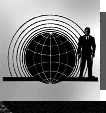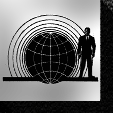Open Channel D. Napoleon?
Do you know what time it is?
Of course. 14:23 hours.
Where you are tovarisch. They made contact?
Yes, I leave tonight. Check the Swiss Account. Mikhail Oblomov, renegade physicist, negotiated a handsome fee.
Capitalist swine.
Au contraire, mon ami. From each according to his abilities, as they say. I'm counting on you to ensure that some of it is directed towards a new office chair. At my desk when I return.
Ouch, typical. Run off and leave me with the hard part. Illya. . .
I know. I will. Kuryakin out.
Napoleon capped the communicator and reached for his robe. There was a chill in the morning air. Illya sounded . . . fine. He swept his hand through his hair. It had been a late night, one of too many lately.
He was on his way back from Irbos when he got the call. They had lost contact with the plane and Illya's homing device at the same time. He sent Petros on to New York to report to Waverly, and took the next flight to Stockholm. Now he stood on the deck of the Swedish cruiser looking at leaden skies and a slate gray sea. Their last few months had taken a toll: Lisbon, Thanatopsis, San Rico. They had fallen out of synch. It was no one's fault, not really, but it had unsettled them. The separate assignments had been a relief.
He pulled up the collar of his jacket. There was no reason to remain here, there was nothing of Illya in this place, only the restless, endless ocean.
Napoleon was back at work when bits of wing and fuselage and a scorched seat cushion washed up near Torgu. He went down to the reception desk after he got the news, took the Number 2 badge and locked it in his top drawer. No one said a word. It was only when he felt the hand on his shoulder that he realized Mr. Waverly had come into the room.
He was looking for a fresh expense sheet in Illya's desk when he found the ring. He fingered it and tried to remember exactly when Illya had stopped wearing it; it seemed important somehow and it bothered him that he couldn't. He brought it home and put it in the tray on his dresser with his own tie clips and cuff links.
That night he dreamed of silken hair in his fingers, a deep slow kiss, a large warm hand moving over his body, caressing him, arousing him; a hard chest pressed against his, two hearts beating.
Napoleon woke up and sat on the edge of the bed, staring into the darkness. They were not lovers. Bedmates now and then; fast, furious couplings in strange hotel rooms, driven by alcohol, adrenaline and need. But never by love. Never spoken of, never by love.
When he introduced himself on the phone, there was a moment of silence, then she responded in serviceable, if accented English. All she wanted, she said, were some photos. Napoleon brought them to Moscow himself. Anna Kuryakina's hair was a darker blonde, shot with gray, but her eyes were Illya's eyes and a tilt of her head and a small half smile caused his heart to constrict. She put the photos on the piano; one of the two of them in an outdoor cafe on the Via Veneto, the other, a picture of Illya with his arms crossed, staring into the camera. He gave her the ring, but she looked at him and put it back in his hand and closed his fingers over it .
"You were his friend," she said.
Napoleon hadn't realized his face was wet.
He moved out of the hotel and spent the next three days with her. She showed him the Moscow Illya had always meant to show him, and talked to him about her too smart, too stubborn and too restless son. And Napoleon thought how much like Illya she was in the things she never asked.
Napoleon scrabbled for the next handhold, the blood from the re-opened wound dripping down his arm, making the rock too slick to grab; he gouged his fingertips into the loose gravel to hold on. The right foot was next, a slow laborious slide to a ledge just inches lower. He wouldn't look down. He might still make it to the bottom if he was lucky. If Thrush didn't realize he'd escaped. If he could keep himself from letting go, the way he wanted to.
Illya would never forgive him if he gave up.
It was another of the unspoken rules in their tangled web of secrets, duty, trust. Not just the meshing of their strengths had made them what they were, it was the way they'd allowed each other their weaknesses. But not this one, this one lay untouched, unmentioned. "God damn it you Russian bastard," he cursed when he stopped to catch his breath, "why are you the only one who gets to die."
Arsene Coria hesitantly passed on a whisper from Karasu, then came an interrupted transmission from Morocco; it was enough to rip off the bandages. When trees grow too close their roots entwine, remaining twisted together in life and in death. Napoleon looked out of the window of the plane at the water below. How raw the wound still felt; how terrifying it was to hope; how alive he was again.
They had just discovered the demolished Thrush lab near Tangier when Waverly called: "Come back Mr. Solo, Mr. Kuryakin is on his way to New York."
Illya was standing in front of the window, arms crossed, waiting for him when he opened the door. He was too thin, his hair chopped short, the top layer bleached by the sun.
"I let myself in," he said, his voice not quite steady. "I don't seem to have any other place to go."
Napoleon saw the tense line of the shoulders, the thrust of the chin, so achingly familiar, so sorely missed. "Illya," he couldn't move, he couldn't think. He hadn't allowed himself to fully believe in the trail he'd been following. "Illya," he repeated more forcefully and stepped into the room.
Illya looked at him and he caught his breath. He had forgotten how blue those eyes were; how much they saw--and how much they could reveal.
Napoleon opened his arms and Illya walked into them. "Never again, Illya," he whispered, "you're never leaving me behind again."
|
|

